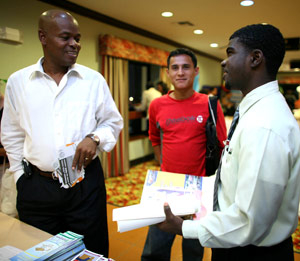News
OPEC Fund and UNFPA Train Thousands of Central American and Caribbean Youth in HIV Prevention
- 26 June 2007
News
BELIZE CITY, Belize — Thousands of young people - nearly 60,000 in Honduras and Guatemala alone - have learned how to protect themselves from HIV, thanks to an initiative supported by the OPEC Fund for International Development and UNFPA, the United Nations Population Fund.
The initiative, 'Prevention of HIV/AIDS Among Youth in Especially Difficult Circumstances' has also encouraged governments and non-governmental organizations in the region to give greater priority to this issue.

At a meeting here last week marking the end of the project, partners took stock of results and compared challenges in implementing the project over the past four years in six Central American and Caribbean nations: Belize, Costa Rica, Guatemala, Guyana, Honduras and St. Lucia.
Over that period, the project has helped organize activities ranging from theatre performances and outreach to youth in the streets to high-level political negotiations.
At the Belize meeting, Steve Kraus, chief of the HIV/AIDS unit at UNFPA, warned that prevention efforts urgently need to be scaled up. "For every person who gets access to antiretroviral medication, there are six new infections. If you are a football player, this is like losing 1 to 6 in every game. It would put you at the bottom of the division pretty quickly," he said.
HIV-prevalence rates in the Caribbean are among the highest in the world, second only to those in sub-Saharan Africa. Among the countries that participated in the project, Honduras and Belize share the highest prevalence rate - 1.5 per cent.
Perhaps the most important achievements of the OPEC Fund/UNFPA effort are the alliances created among civil society organizations, the increased government commitment to HIV prevention efforts and the mobilization of youth to educate their peers, said Raquel Child, a Regional Adviser for HIV prevention for UNFPA in Latin America and the Caribbean.
An evaluation study of the prevention activities concluded that participation by youth was essential for the success of the programme. It also found that youth-friendly health services encouraged trust and dialogue about the issues among youth, and that human rights protection can be an important link with HIV prevention, particularly in the case of vulnerable groups, such as young migrants.
The OPEC Fund contributed $3.2 million to the programme, with UNFPA providing $1 million in in-kind support. Several project partners are optimistic that the work will continue. Douglas Hyde, a Belizean Youth Ministry official who has coordinated parts of the project activities in Belize said: “We have the attention of the [political] leaders now. I am already negotiating for more funds to continue the work.
— Trygve Olfarnes